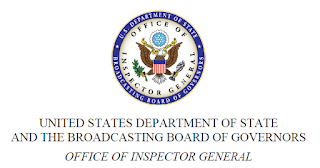The Washington Post of 23 Jan 2013 ran an article (article
at: http://www.washingtonpost.com/national/report-blasts-foreign-broadcasting-board-as-dysfunctional-and-ineffectual/2013/01/22/1f3b1a84-64cd-11e2-9e1b-07db1d2ccd5b_story.html?hpid=z9)
about a scathing Department of State IG Report (see http://oig.state.gov/documents/organization/203193.pdf)
on the Broadcasting Board of Governors (BBG).
The BBG “oversees all US
Government-supported, civilian international broadcasting”. This includes the
Voice of America (VOA), Office of Cuba Broadcasting (OCB), as well as private,
nonprofit corporations: Radio Free Europe/Radio Liberty, Radio Free Asia and
the Middle East Broadcasting Networks. The BBG FY 2013 budget request was $720
million.
The report was classified as “Sensitive But Unclassified”
but was redacted in part and released as unclassified. There were a number of “Key
Judgments” cited in the report. Among them was a comment praising the
commitment of the broadcast entities and professional staff, but that was the
only positive comment.
The report blasts the Board from a number of angles. The
report indicated that a part time entity such as the board cannot coordinate
appropriately especially without a CEO. Dysfunctionality of the board was noted
due to “one member”. Systemic issues included chronic vacancies, lack of a
logical travel policy, absences of Board members and inadequate by-laws and
governance policies.
A review of the entire report reads like a bad Harvard
Business School Case Study. The IG provides a number of recommendations
including several that appear to be very basic, common sense management.
This posting will not discuss the recommendations, but will
step back and look at the impact of the report. The Department of State is the
US voice overseas and the broadcasting companies under the BBG are like the ‘information
artillery’ for Public Diplomacy. That is, they should provide consistent
support to US objectives and provide their audiences with high quality
information comparable to any world class information or entertainment medium.
Public Diplomacy is a cornerstone of today’s influence
operations. The MISO Community has a symbiotic relationship with the Department
of State. MIS teams may be employed to support embassy staff on one end of the
spectrum and on the other MIS Task Forces may be deployed to hostile areas to
take on the primary burden of supporting US informational efforts.
It is this symbiotic relationship and the need to depend on
our DOS partners that underscores the need for an efficient and effective BBG.
As the size of the DOD force shrinks, the need for consistent broadcasting
efforts will likely increase thereby exacerbating the need for optimal
management of the DOS resources.
The fact that the BBG’s effectiveness has deteriorated so
drastically should be of major concern to the President as he shifts his
foreign policy gears during his second term. It may also mean that MIS forces
may not be able to count on any support from a population that has been
listening to US informational broadcasts.


No comments:
Post a Comment